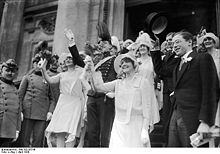- Otto Christian Archibald von Bismarck
-
Otto Christian Archibald von Bismarck 
The wedding of the Prince of Bismarck and Ann-Mari Tengbom, in the Berliner Dom, 1928. President Paul von Hindenburg, members of the cabinet and representatives of the Swedish embassy were present Prince of Bismarck Reign 18 September 1904 - 24 December 1975 (71 years, 97 days) Predecessor Herbert von Bismarck Successor Ferdinand von Bismarck Spouse Ann-Mari Tengbom Issue Ferdinand von Bismarck
Maximilian von Bismarck-Schönhausen
Gunilla von Bismarck-Schönhausen
Leopold von Bismarck-SchönhausenHouse Bismarck family Born 25 September 1897 Died 24 December 1975 (aged 78) Styles of
The Prince of Bismarck
Reference style His Serene Highness Spoken style Your Serene Highness Alternative style Sir Otto Christian Archibald, Prince von Bismarck (25 September 1897, Schönhausen, Brandenburg – 24 December 1975) was a German politician and diplomat, and the Prince of Bismarck from 1904 to his death.
He was the elder son of Herbert von Bismarck, as well as the grandson of the famous Otto von Bismarck and elder brother of Gottfried Graf von Bismarck-Schönhausen. A lawyer, he became the owner of the family estate in Schönhausen, and joined the diplomatic service in 1927, serving in Stockholm (1927–28), London (1928–37), with the Foreign Ministry in Berlin (1937–40), as Envoy to Rome (Kingdom of Italy) (1940–43), and finally as head of the Italian section of the Foreign Ministry (1943–44).
He was a member of the DNVP (the conservative party) in the Weimar Republic, and served as a Member of Parliament from 1924 to 1928. In 1933 he joined the Nazi Party and in 1935 he became a member of the Anglo-German Fellowship. In the 1950s he considered becoming a member of the FDP (the liberal party), which offered him a nomination for Parliament, but eventually joined the conservative CDU instead. He served as a Member of Parliament for the constituency of Herzogtum Lauenburg (Duchy of Lauenburg, his grandfather held the title Duke of Lauenburg) from 1953 to 1965, and as a member of the foreign affairs committee. He was also a member of the Parliamentary Assembly of the Council of Europe, and served as its Vice President from 1959 to 1960 and from 1961 to 1966. He was also chairman of the Deutsche Parlamentarische Gesellschaft from 1957 to 1961. He received the Great Cross of Merit in 1965.
Bismarck married Ann-Mari Tengbom (1907–1999), a native of Sweden, on 18 April 1928, and they had six children, including the current head of the princely House of Bismarck, Ferdinand von Bismarck, and the philanthropist Gunilla von Bismarck. His grandson Carl-Eduard von Bismarck served as a Member of Parliament, representing the CDU for the constituency Herzogtum Lauenburg, from 2005 to 2007.
See also
German nobility Preceded by
Herbert von BismarckFürst von Bismarck
1904–1975Succeeded by
Ferdinand von BismarckPolitical offices Preceded by Member of Parliament
1924–1928Succeeded by Preceded by Member of Parliament for the Duchy of Lauenburg
1953–1965Succeeded by Preceded by Chairman of the Deutsche Parlamentarische Gesellschaft
1957–1961Succeeded by Diplomatic posts Preceded by German Envoy to the Kingdom of Italy
1940–1943Succeeded by Categories:- 1897 births
- 1975 deaths
- People from the District of Stendal
- German National People's Party politicians
- German Nazi politicians
- Christian Democratic Union (Germany) politicians
- People from the Province of Brandenburg
- German diplomats
- Bismarck family
- Members of the Bundestag
- Members of the German Reichstag
- Commanders Crosses of the Order of Merit of the Federal Republic of Germany
- German nobility stubs
- German politician stubs
Wikimedia Foundation. 2010.
